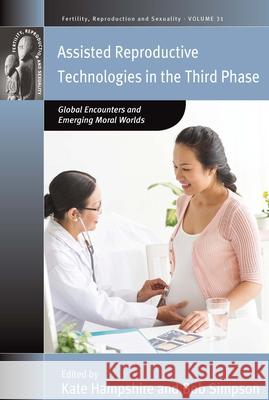Assisted Reproductive Technologies in the Third Phase » książka
Assisted Reproductive Technologies in the Third Phase
ISBN-13: 9781782388074 / Angielski / Twarda / 2015 / 284 str.
..".a fascinating read... The complex intersections between gender, kinship, region, nationality, ethnicity, and religion - as well as the vicissitudes of individual agency - are very clearly demonstrated in this volume. For this alone it will be welcomed as a substantial accomplishment." - Sarah Franklin, Cambridge University Following the birth of the first "test-tube baby" in 1978, Assisted Reproductive Technologies became available to a small number of people in high-income countries able to afford the cost of private treatment, a period seen as the "First Phase" of ARTs. In the "Second Phase," these treatments became increasingly available to cosmopolitan global elites. Today, this picture is changing - albeit slowly and unevenly - as ARTs are becoming more widely available. While, for many, accessing infertility treatments remains a dream, these are beginning to be viewed as a standard part of reproductive healthcare and family planning. This volume highlights this "Third Phase" - the opening up of ARTs to new constituencies in terms of ethnicity, geography, education, and class. Kate Hampshire is Reader in Anthropology at Durham University. She recently co-edited (with Gina Porter and Janet Townsend) Children and Young People as Knowledge Producers (Routledge, 2014). Bob Simpson is Professor of Anthropology at Durham University. He is the author of Changing Families: An Ethnographic Approach to Divorce and Separation (Berg, 1998).
"...a fascinating read... The complex intersections between gender, kinship, region, nationality, ethnicity, and religion - as well as the vicissitudes of individual agency - are very clearly demonstrated in this volume. For this alone it will be welcomed as a substantial accomplishment." · Sarah Franklin, Cambridge UniversityFollowing the birth of the first "test-tube baby" in 1978, Assisted Reproductive Technologies became available to a small number of people in high-income countries able to afford the cost of private treatment, a period seen as the "First Phase" of ARTs. In the "Second Phase," these treatments became increasingly available to cosmopolitan global elites. Today, this picture is changing - albeit slowly and unevenly - as ARTs are becoming more widely available. While, for many, accessing infertility treatments remains a dream, these are beginning to be viewed as a standard part of reproductive healthcare and family planning. This volume highlights this "Third Phase" - the opening up of ARTs to new constituencies in terms of ethnicity, geography, education, and class.Kate Hampshire is Reader in Anthropology at Durham University. She recently co-edited (with Gina Porter and Janet Townsend) Children and Young People as Knowledge Producers (Routledge, 2014).Bob Simpson is Professor of Anthropology at Durham University. He is the author of Changing Families: An Ethnographic Approach to Divorce and Separation (Berg, 1998).











